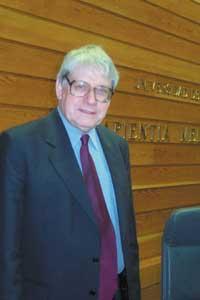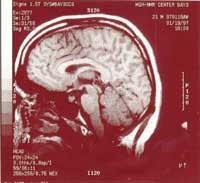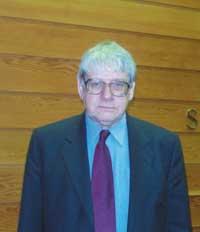Alan Baddeley: A lot of work has been done to try to understand the neurochemical basis of memory.
What is memory and activity memory used in psychology?

In general, memory is the ability to store information and use it later. It can be divided into several systems. We use the terms long-term memory and activity memory. Activity memory is a system that manages information while "working". It consists of several components: spoken, visual and attention controller.
So is activity memory similar to short-term memory?
That is. The original idea of short-term memory involved a simple unitary system. Activity memory is the result of the evolution of this concept, a much more complex system.
Each type of memory is stored in a certain area of the brain. Is this organized because brain tissue is different?
It is true that different areas of the brain intervene. But we don't really know what the answer to the second question is. Much work has been done to try to understand the neurochemical basis of memory and there are still great debates.
But do you have each of these zones?
In the brain there are several areas that have a lot to do with the characteristics of memory. Activity memory is located in the left hemisphere. Through PET scanning we have identified two areas that we can relate to two aspects of memory that we had previously postulated. One accumulates information and the second has a test production system. Activity memory is probably related to systems that understand and create speech.
Memory changes with the person's age. If this is so, is it necessary to work that memory in childhood?
Change does occur. As age progresses memory changes, especially long-lasting memory. The ability to receive and store new information varies greatly. Normally, young children will not later remember what they have lived during the first four or five years of their life. From there memory begins to "build" and the ability to remember things increases. The age range of thirty-forty is the best time to remember. From then on the ability to remember people's names is decreasing. This is the usual process.
Is there a method to improve or maintain memory for a long time?
Yes, yes. Some methods help you remember things. In general, they help relate the new information we already know. Rehearse, rather than internalize everything at once, swallow information slowly, etc. can be techniques to learn things more effectively. However, there are no such recipes. There is also no assurance that these techniques are always appropriate. In short, we have not yet obtained evidence of the results.
Do all treated diseases have physical origin in the brain?
I think so. But a piece of tissue is usually not missing in the brain. It can be a problem of neurochemical processes.

Does the experience and wisdom of neuropsychologists help physically situate these diseases in the brain?
Yes. Brain scan methods are usually used. Modern techniques have been developed to scan and search for tumors, for example. However, our analyses are very useful to have some clue as to whether something is wrong and where to look. The combination of techniques is the one that provides the most information. However, the techniques and strategies to be used are determined according to each person and the treatment.
What is your greatest contribution to neuropsychology?
My research has focused on the memory of activities. I have written a couple of textbooks on this subject.
He has also prepared some tests to use in research, right?
I develop tests to help in my research. On the one hand, so that patients (even if they are called somehow) will receive some of the research again. I've learned a lot from all that. Tests tell you a lot of interesting things you didn't know before.
These tests should be calibrated in some way. How is it done?
That is. It is something to do and is often quite laborious. Hundreds of people are needed and some of them must be carefully selected for examples from all walks of life. Therefore, it cannot be calibrated with simple students. The full age option and all types of individuals will be included. Finally, a comprehensive statistical analysis is required. Therefore, it is a long work.
What characteristics should a test have to be suitable?
The first thing to do is choose something measurable, something that has not yet been measured. It must provide repeatable results, that is, if the test is frequently used it would have the same results. It has to be integral, that is, that as far as possible there are no marginalized groups. On the other hand, it is very important that the test be attractive to the patient, not boring. Otherwise, the results are unreliable. Finally, a good test should be suitable for use in both research and clinical trials. But preparing it takes a long time. In addition, there are already many tests and people do not want to change.
Are the research tests different from those applied to clinical treatment?
They are different because in clinical use you do not need to receive as much data as in research. If a research test has a great potential, it is about developing it for clinical use, which forces its adaptation.

In the tests you've prepared, distribute the memory and recognition capabilities. What is the difference?
You know something when you know you've seen it before. Remembering involves reproducing something. For example, when you have trouble remembering my name, if I mention the word Baddeley, you will know my name. Remembering involves producing a response.
Which of the two is more difficult?
Normally, remembering becomes more difficult when you face similar things, but in general it is more difficult to know them.
When someone is reading, what kind of memory is working? Visual capacity?
It is not a visual power, but what is related to speech. The faster you read, the sound of each word may lose importance. But if you are learning to read, phonology is absolutely decisive. The sound of the word helps you create a relationship between letters and meaning.
However, people who read very quickly, looking at a place on the page, are able to read the whole page. Is it not related to visual power?
I think this kind of people jump and catch somewhere somewhere somewhere, but don't read all the words. You can get a lot of information without reading everything. They require visual capability, but not just the visual power of memory.
Buletina
Bidali zure helbide elektronikoa eta jaso asteroko buletina zure sarrera-ontzian











